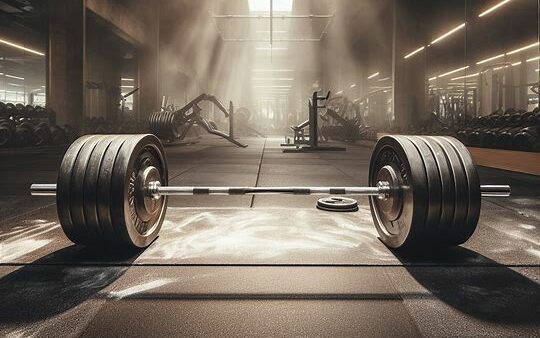Have you ever wandered into your garage gym, looked at your deadlift bar, and wondered, “Can I use this for bench pressing?” You’re not alone in this thought.
Many home and garage gym owners have pondered this question.
While the short answer is yes, you can use a deadlift bar to bench press, the more comprehensive response is, that you probably shouldn’t.
Let’s find out why!
Table Of Contents
- 1 Understanding the Deadlift Bar and Bench Press
- 2 Differences Between a Deadlift Bar and a Bench Press Bar
- 3 Possible Risks and Safety Concerns
- 4 Frequently Asked Questions
- 4.1 Should I stop benching with a deadlift bar?
- 4.2 Is there a difference between deadlift and bench bars?
- 4.3 What bar should I use for the bench press?
- 4.4 Why do people bench with a deadlift bar?
- 4.5 Is it OK to bench with a squat bar?
- 4.6 Can you bench press with a 5 ft bar?
- 4.7 Can you bench press with a hex bar?
- 4.8 Can you bench press with a short bar?
- 5 Conclusion
Understanding the Deadlift Bar and Bench Press
Before diving into the debate about using a deadlift bar for bench pressing, it’s crucial to understand the distinct characteristics of both the deadlift bar and the bench press itself.
Let’s break down what makes each unique and their primary purposes in strength training.
What is a Deadlift Bar?
A deadlift bar, as the name suggests, is designed specifically for deadlifts.
It’s uniquely constructed to flex more than a standard power bar. This “whip” allows lifters to take the slack out of the bar before the pull, giving better speed off the floor.

Not only is it slightly longer, but its thinner diameter coupled with more knurling offers a much-improved grip, ensuring that the bar doesn’t slip from your hands during heavy pulls.
Want to know more about the deadlift bar? Read more here.
What is the Bench Press?
Bench press, a favorite among many gym-goers, targets the pecs, shoulders, and triceps. In this exercise, you lie on a bench and push a weight upwards from a chest position.
The bench press bar is usually more rigid and designed to provide stability during the lift.
Differences Between a Deadlift Bar and a Bench Press Bar
At a glance, most barbells might seem identical.
However, when you delve deeper into their specifications and design purposes, the differences between a deadlift bar and a bench press bar become more evident.
Here, we’ll explore these distinctions in detail.
Bar Length and Diameter
Deadlift bars are generally longer than your typical bench press bars.
Additionally, they are thinner, which, while great for deadlifting, may not offer the same stability when bench pressing heavy weights.
Learn about different deadlift bars here.
Knurling and Grip
Deadlift bars come with more knurling, ensuring a better grip.
This grip might feel different when bench pressing, especially if you’re used to the feel of a normal bench press bar.
Flexibility and Whippiness
The hallmark of a deadlift bar is its flexibility or “whip.” While this is advantageous for deadlifts, it’s not ideal for bench presses.
When benching heavy weights, this excessive flex can make the bar feel too springy, reducing stability during the lift.
Possible Risks and Safety Concerns
Safety should always be a priority in any lifting routine.
While the idea of using a deadlift bar for bench pressing might seem tempting for some, it’s essential to be aware of the potential risks and safety concerns associated with such a choice.
In this section, we’ll highlight the challenges and precautions you should consider.
Weight Distribution and Stability
Given the flex of a deadlift bar, weight distribution becomes a concern.
When loaded, the bar may bend, affecting your ability to evenly distribute the weight across the bar, potentially leading to an imbalance during the lift.
Potential Injury Risks
Using a deadlift bar for bench pressing, especially bars like the elephant bar, could pose a risk of injury.
The excessive flexing under heavy weight might strain or injure the shoulders, wrists, elbows, just everything basically.
Proper Technique and Form on a Deadlift Bar for Bench Press
If you still decide to go ahead and use a deadlift bar for benching, ensure you maintain proper form.
The thinner bar may feel different in your hands, so focus on grip and stability. Ensure the bar is loaded evenly and be cautious of the extra flex.
Frequently Asked Questions
Conclusion
In conclusion, while it’s possible to use a deadlift bar for bench pressing, it might not be the best choice due to the differences in design and potential safety concerns.
It’s always best to use equipment for its intended purpose to ensure optimal performance and safety.
What are your thoughts on this? Have you ever tried benching with a deadlift bar?
Until next time,
-Dante